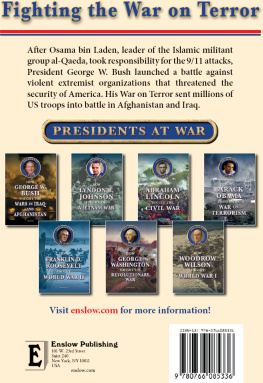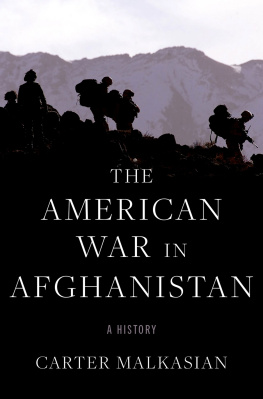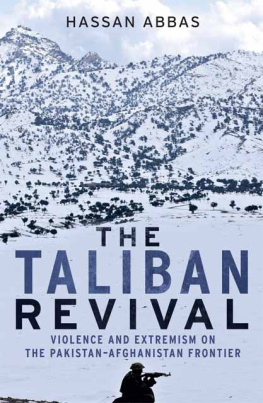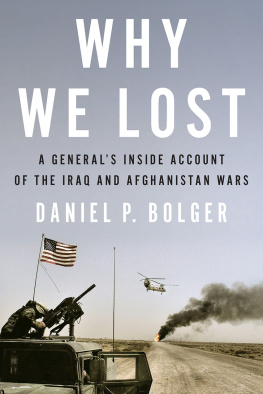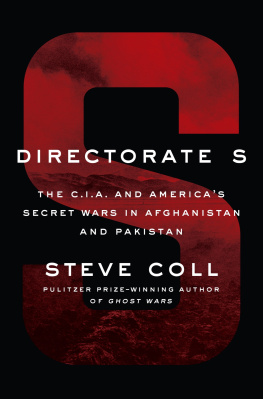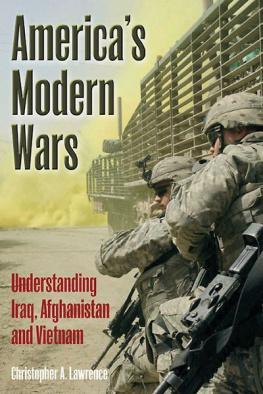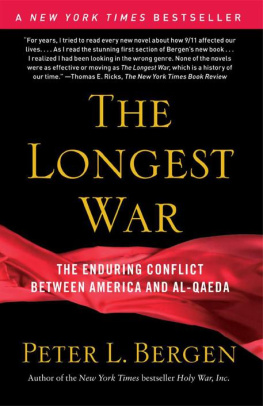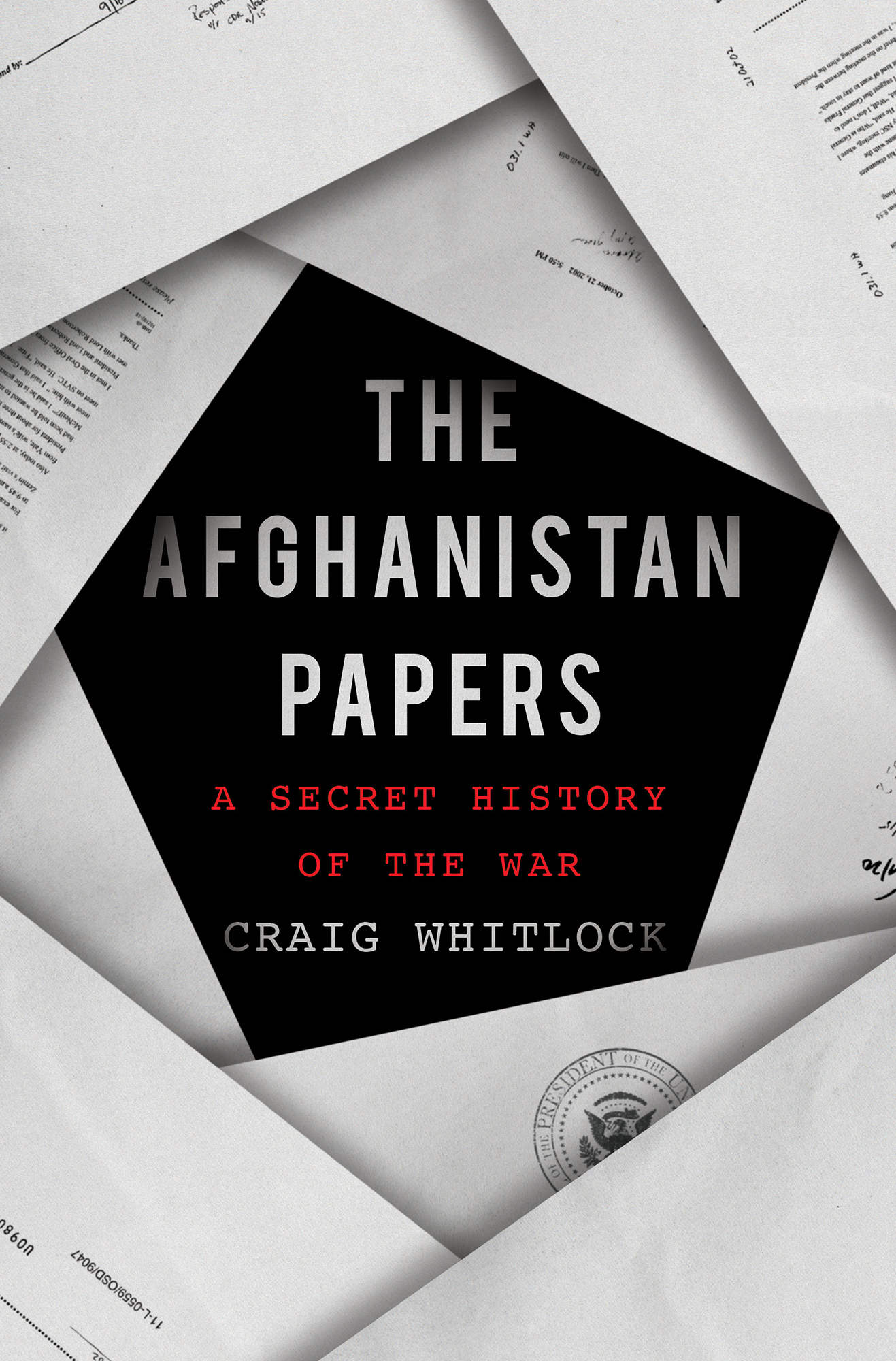Contents
Guide
THE AFGHANISTAN PAPERS
A SECRET HISTORY OF THE WAR
CRAIG WHITLOCK

Simon & Schuster
1230 Avenue of the Americas
New York, NY 10020
www.SimonandSchuster.com
Copyright 2021 by WP Company LLC
All rights reserved, including the right to reproduce this book or portions thereof in any form whatsoever. For information, address Simon & Schuster Subsidiary Rights Department, 1230 Avenue of the Americas, New York, NY 10020.
First Simon & Schuster hardcover edition August 2021
SIMON & SCHUSTER and colophon are registered trademarks of Simon & Schuster, Inc.
For information about special discounts for bulk purchases, please contact Simon & Schuster Special Sales at 1-866-506-1949 or .
The Simon & Schuster Speakers Bureau can bring authors to your live event. For more information or to book an event, contact the Simon & Schuster Speakers Bureau at 1-866-248-3049 or visit our website at www.simonspeakers.com.
Jacket design by David Litman
Jacket photographs: Papers courtesy of the author;
Seal by Alan Cotton/Alamy Stock Photo;
Paper texture by Nenov/Getty Images
Library of Congress Cataloging-in-Publication Data Names: Whitlock, Craig, author. Title: The Afghanistan papers : a secret history of the war / Craig Whitlock. Description: First Simon & Schuster hardcover edition. | New York : Simon & Schuster, 2021. | Includes bibliographical references and index. Identifiers: LCCN 2021016683 | ISBN 9781982159009 (hardcover) | ISBN 9781982159023 (ebook) Subjects: LCSH: Afghan War, 2001 Classification: LCC DS371.412 .W4825 2021 | DDC 958.104/7dc23 LC record available at https://lccn.loc.gov/2021016683
ISBN 978-1-9821-5900-9
ISBN 978-1-9821-5902-3 (ebook)
For Jenny and Kyle,
with love and admiration
Only a free and unrestrained press can effectively expose deception in government. And paramount among the responsibilities of a free press is the duty to prevent any part of the government from deceiving the people and sending them off to distant lands to die of foreign fevers and foreign shot and shell.
Supreme Court Justice Hugo L. Black, in his concurring opinion in New York Times Co. v. United States, also known as the Pentagon Papers case, June 30, 1971. In a 63 decision, the Court ruled that the U.S. government could not block The New York Times or The Washington Post from publishing the Defense Departments secret history of the Vietnam War.
Foreword
T wo weeks after the 9/11 attacks, as the United States girded for war in Afghanistan, a reporter asked Defense Secretary Donald Rumsfeld a straightforward question: Would U.S. officials lie to the news media about military operations in order to mislead the enemy?
Rumsfeld stood at the podium in the Pentagon briefing room. The building still smelled of smoke and jet fuel from when American Airlines flight 77 exploded into the west wall, killing 189 people. The defense secretary started to reply by paraphrasing a quotation from British Prime Minister Winston Churchill: In wartime, truth is so precious that she should always be attended by a bodyguard of lies. Rumsfeld explained how the Allies, prior to D-Day, ran a disinformation campaign called Operation Bodyguard to confuse the Germans about when and where the invasion of western Europe would take place in 1944.
Rumsfeld sounded as if he were justifying the practice of spreading lies during wartime, but then he pivoted and insisted he would never do such a thing. The answer to your question is, no, I cannot imagine a situation, he said. I dont recall that Ive ever lied to the press. I dont intend to, and it seems to me that there will not be reason for it. There are dozens of ways to avoid having to put yourself in a position where youre lying. And I dont do it.
Asked if the same could be expected of everyone else in the Defense Department, Rumsfeld paused and gave a little smile.
Youve got to be kidding, he said.
The Pentagon press corps laughed. It was classic Rumsfeld: clever, forceful, unscripted, disarming. A former star wrestler at Princeton, he was a master at not getting pinned down.
Twelve days later, on October 7, 2001, when the U.S. military began bombing Afghanistan, no one foresaw that it would turn into the most protracted war in American historylonger than World War I, World War II and Vietnam combined.
Unlike the war in Vietnam, or the one that would erupt in Iraq in 2003, the decision to take military action against Afghanistan was grounded in near-unanimous public support. Shaken and angered by al-Qaedas devastating terrorist strikes, Americans expected their leaders to defend the homeland with the same resolve as they did after the Japanese attack on Pearl Harbor. Within three days of 9/11, Congress passed legislation authorizing the Bush administration to go to war against al-Qaeda and any country that harbored the network.
For the first time, the North Atlantic Treaty Organization (NATO) invoked Article 5, the alliances collective commitment to defend any of its member states under attack. The United Nations Security Council unanimously condemned the horrifying terrorist attacks and called on all countries to bring the perpetrators to justice. Even hostile powers expressed solidarity with the United States. In Iran, thousands attended candlelight vigils and hardliners stopped shouting Death to America at weekly prayers for the first time in twenty-two years.
With such strong backing, U.S. officials had no need to lie or spin to justify the war. Yet leaders at the White House, the Pentagon and the State Department soon began to make false assurances and to paper over setbacks on the battlefield. As months and years passed, the dissembling became more entrenched. Military commanders and diplomats found it harder to acknowledge mistakes and deliver clear-eyed, honest assessments in public.
No one wanted to admit that the war that started as a just cause had deteriorated into a losing one. From Washington to Kabul, an unspoken conspiracy to mask the truth took hold. Omissions inexorably led to deceptions and eventually to outright absurdities. Twicein 2003 and again in 2014the U.S. government declared an end to combat operations, episodes of wishful thinking that had no connection to reality on the ground.
President Barack Obama had vowed to end the war and bring all the troops home, but he failed to do so as his second term neared an end in 2016. Americans had grown weary of endless conflict overseas. Disillusioned, many people stopped paying attention.
By then I had logged almost seven years as a beat reporter covering the Pentagon and the U.S. military for The Washington Post. I had covered four different secretaries of defense and five war commanders, traveling with senior military officials to Afghanistan and the surrounding region on many occasions. Before that, I had reported overseas for six years as a Washington Post foreign correspondent, writing about al-Qaeda and its terrorist affiliates in Afghanistan, Pakistan, the Middle East, North Africa and Europe.
Like many journalists, I knew Afghanistan was a mess. I had grown dismissive of the U.S. militarys hollow statements that it was always making progress and on the right track. The Washington Post and other news organizations had exposed systemic problems with the war for years. Books and memoirs had delivered insider accounts of pivotal battles in Afghanistan and political infighting in Washington. But I wondered if everyone had missed the big picture.



